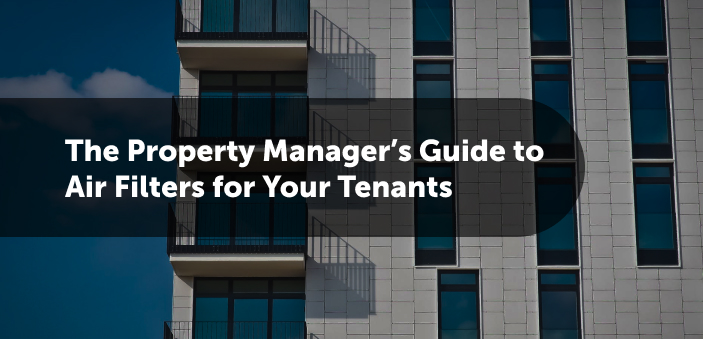
The Property Manager’s Guide to Air Filters for Their Tenants
You provide a lot more for your tenants than a lot of them realize. It’s no fault of their own, they’re just happy to be in such a stellar living environment - the thought of what goes into that is often lost to the wayside.
If you manage rental properties, whether residential or commercial, you know what I’m talking about. Keeping a living or working space up to par and in compliance with laws takes a vast amount of work and money.
Your rental spaces are the culmination of thousands of dollars and labor hours - all serving to create the ideal living or working space for your tenants. Everything from the safety of the complex, to floor repairs, to making sure every door knob works as it should, comes down to your hard work. It’s worth it, of course, because you love your tenants. But it takes a lot to make sure nothing gets overlooked.
One thing that tends to get overlooked is the air filters you use in your properties. It’s understandable - even people who own their house forget to replace theirs!
Filter King specializes in air filters. Let’s walk through some of the best choices for your tenant’s air filters, from the cheap and effective to the premium and luxurious!
Best Air Filters to Buy in Bulk
For standard apartments in large complexes, you need an air filter that delivers quality air while keeping rent down.
Filter King makes a MERV 8 filter that is perfect for this. MERV, or Minimum Efficiency Reporting Value, is a metric that defines how effectively a filter cleanses the air that passes through it. MERV 8 is good enough to protect against pollen, mold, dust and dust mites, and most bacteria. These filters are extremely affordable, and can be bought at bulk without breaking the bank. If you own a complex of several hundred units, we recommend Filter King MERV 8 filters to give your tenants the clean air they deserve at the competitive pricing they’ve come to expect.
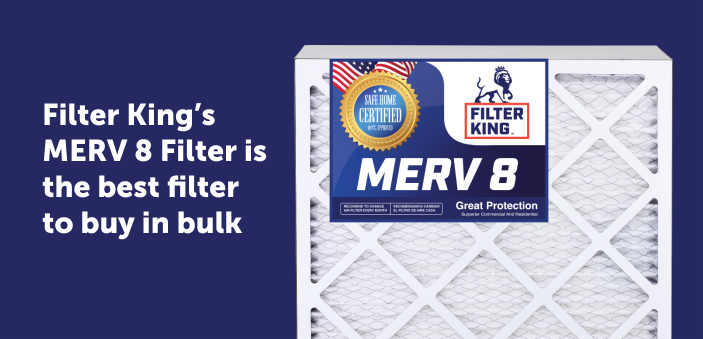
MERV 8s are also the best choice for office buildings. As we’ll see later on, MERV 8s don’t effectively collect pet dander. Since pets typically don’t roam around workplaces, you won’t need to spend the extra cash on something more comprehensive. You can offer clean air without hiking rent for your commercial tenants.
Best Air Filters for Luxury Apartments
If you own a luxury apartment complex, you know your tenants are willing to pay a premium for quality. The air filters you use in them should reflect that.
The best air filters for luxury apartments are Filter King’s MERV 11 filters. They filter everything the MERV 8s do, plus pet dander. This means your tenants can enjoy the company of friends in their apartment without that pet dander affecting their neighbors, who might be allergic.
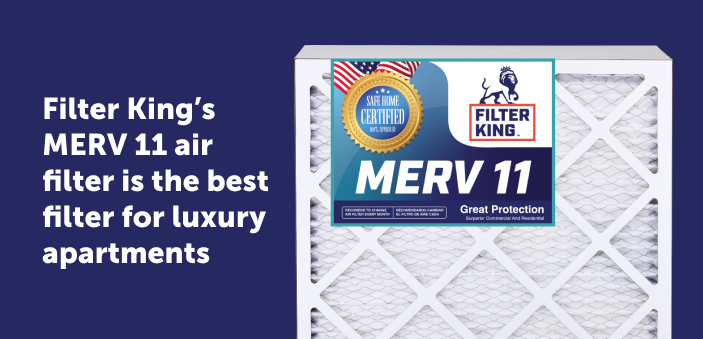
Note that, even if your apartments aren’t classified as luxury, you should still consider MERV 11s if you allow pets. Tenants are more likely to stay with you if their allergies don’t flair up because of their neighbor’s dog. Remember, in apartment complexes where the units are attached, everyone is sharing the same air.
MERV 11s are particularly good for luxury apartments because they filter out smaller dust particles than MERV 8s. This means the sair in your tenant’s apartments is just as clean and luxurious as the rest of your facility.
Best Air Filter for Rental Homes
Homes have a key difference in their air filter needs compared to apartments - size.
Rental homes tend to be larger than apartments. Sometimes, they have more intake vents to account for this. But more often than not, the ratio of square footage to the number of intake filters is drastically higher for a house than it is for apartments. This means that a larger volume of contaminants are coming through the filter in a house, which requires a more effective filter.
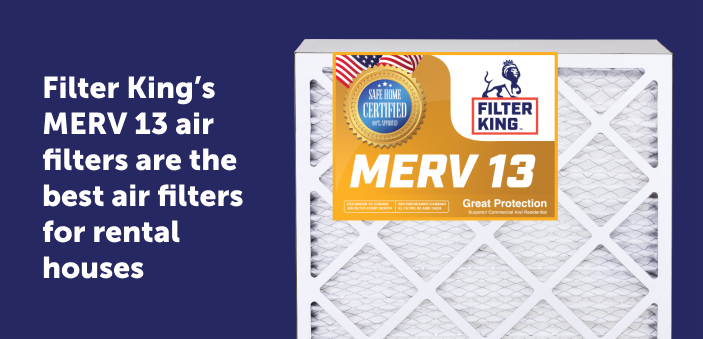
Filter King offers a MERV 13 filter in just about every size you can imagine. MERV 13 filters take care of everything the lower MERV filters do, plus viruses, cooking smoke, tobacco smoke and smog. Because your tenants have such a large space, there needs to be more filtering power.
Because apartments are smaller, a given amount of air is cycled more times per day through the filter. In a house, that air won’t cycle as many times. That means the air needs to be filtered as much as possible with every cycle in order to maintain peak quality.
You might like reading: How much do air filters cost?
Best Air Filter for Luxury Rental Homes
Since luxury rental homes tend to be larger, it only makes sense to use a filter with MERV 13 or higher. We recommend one of Filter Kings MERV 13 Titanium filters to give your property a competitive edge. In conjunction with blocking all of the contaminants of the previous filters, MERV 13 Titanium filters also filter out odors. In a living space, where entire families eat, cook, play, relax, use the restroom, and sometimes work, odors can build up fast.
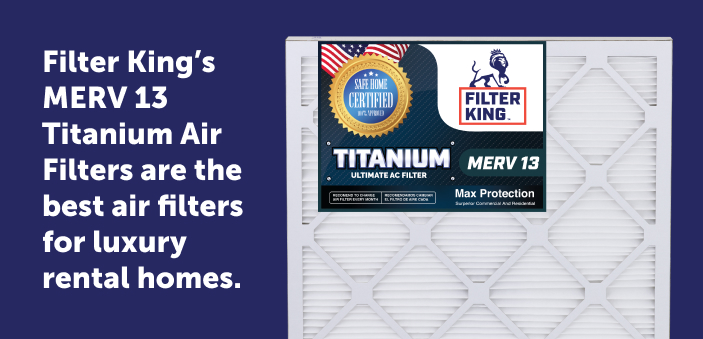
Show your tenants you care by outfitting them with the best air filter on the market.
Check out Filter King’s store for all of these filters in any size you need. We offer the best prices and the smoothest delivery in the industry. Find out why they call us the King!
The Property Managers’ Guide to AC For Their Tenants
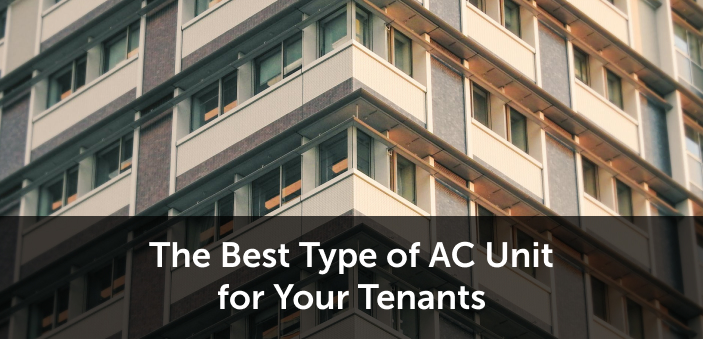
Depending on the geographical area of your property, you tenants will have different needs, and different laws, applying to their use of air conditioning.
The purpose of this article is to provide a general guideline to property managers like you, so they can have a quick reference for general strategies regarding AC for their tenants.
Bear in mind, of course, that Filter King is not a law firm. The advice in this column is not meant to be, nor should be regarded as, legal advice. Before changing anything about your property’s AC system, consult your lawyer.
With that out of the way, let’s get into it!
The Best Type of AC Unit for Your Tenants
The AC you choose for your tenants will depend largely on two things - first, your location within the U.S.
In the southern states, AC is an absolute necessity. Failing to provide not only makes your property essentially unrentable - it could also be against the law.
For northern states, where even summer temperatures stay manageable, there may be some wiggle room.
The second factor that will contribute to your choice in AC is your market. The AC you’ll want for luxurious Class A apartments is not the same as what you’ll want for budget Class C properties.
Let’s break down these differences some more.
For luxurious apartments, you’ll want AC as a permanent amenity. This means a thermostat on the wall and built in vents - central AC is your best option here.
While central AC is more expensive to install than, say, a window unit, it will allow you to justifiably increase rent for those who are willing and able to live with that luxury.
A central AC system is also more reliable than portable units, and is easier to repair overall. With portable or window units, each apartment has their own self-contained system for air conditioning. If one of them breaks, you may have to replace the entire system. That means replacing the cooling system, the filter, the ducts, the electrical system, the capacitors, and the connectors all in one go (since the system includes all of these parts.) Central AC, by contrast, only has one cooling system, electrical system, and some recurrent components that power the AC in several apartments. If there is a problem, replacing only one component of the entire system is often all that is necessary.
For less luxurious apartments, like Class C budget housing, wall units and portable units may be the better option. Window units or portable units are cheaper and easier to install, making your overall cost upfront lower than owning or managing a luxury property. This means rent can be lower, and you can continue to supply affordable housing to those who need it.
Often, AC for budget apartments in cooler climates can be an option provided for a cost to the tenant, or can be provided by the tenants themselves.
For rental houses, the biggest factor for the decision to offer AC is location. In the north, it can be foregone, as it traditionally has been. Of course, check your local legislature to ensure you don’t break any laws.
In the south, AC in a house, which will likely be central, is almost always the right choice.
The Finances Behind AC for your Tenants
You’re a businessperson. You operate on a set of principles - doing what's right, while maintaining a return on investment that allows you to preserve wealth for future generations and build a legacy.
Return on investment is perhaps the most important ratio for any businessperson. Defined as the gain on an investment divided by the initial cost of said investment, return on investment represents the very purpose of business and needs to be maximized while maintaining compliance with laws and an attention to ethical prudence.

It’s the nest for all other financial concepts - everything you do as a businessperson eventually comes back to return on investment. Installing AC for your tenants is no different.
The average cost of installing central air in a home is $5,500. This is certainly a sizable investment, but let's break it down to see if it's worth it.
Zillow is a great tool for landlords, both in finding estimates for properties and because of the sheer amount of information they collect about rents and amenities.
Using this information, Zillow has clocked the average premium that renters will pay for central air to be 2.8% of the rent. Of course, this encompasses a wide range of averages for specific cities. For example, in Denver, renters will only pay an additional 1.3% of the rent for central AC. In Las Vegas, by contrast, renters will pay an extra 10.4% of the rent for central air.
This means we must factor location into our financial analysis. In fact, let's find a specific city, south of which it becomes worth it to install central air.
First, assume we have a loan on a house that we will be renting out. The initial cost of this house was $250,000, with an interest rate of 5%, and amortization of 30 years.
This puts our mortgage around $1,300 per month. Our renters pay all utilities, but we are responsible for repairs and taxes equal to $7,000 per year, or $583.33 per month
Calculating our rent using the 50% rule, we find that $1,300 (mortgage breakeven) plus $583.33 times 2 (expenses relative to 50% rule), equals $2,466.67 per month. This implies a payback period of the value of the house of around 8.5 years. (Of course, this is an oversimplified method of calculating rent - I use it for the sake of brevity and reader convenience.)
Now, we need our tenant to pay off our $5,500 investment for AC within that 8.5 years, which means we must upcharge rent by around $55 per month. This represents just 2.23% of our rent.
According to Zillows information, Cincinnati residents will pay a 2.3% premium for central AC. This implies, with certain tolerances for market saturation etc., that any property with similar interest rates, central AC installation costs, and rent, that is further south than Cincinnati, should be outfitted with central AC.

Whew! That was pretty fast and loose. Obviously, there are a million more factors to consider, but this should give you a stepping stone for analyzing whether or not to install central AC for your tenants.
Interestingly, buying a house with central AC costs an additional amount over the cost of a house without it that is exactly the cost to install central AC in an existing house (around $5,500). That means this analysis can be used when debating whether to buy a rental house with or without central AC.
As for AC filters for your tenants, we got you covered. Check out our online store and get any kind of filter in any size! Our delivery is fast and easy, and you can even set up a filter subscription, so you never forget to replace them. That’s why we’re the Filter King!
